English Reading & Phonics
Reading Intent
At Mottram CE Primary, we believe that one of our most important duties as teachers is to provide every child with the right tools to become a ‘reader’. We are passionate about fostering a lifelong love of reading within all our children. Reading opens a new world for children and provides them with opportunities to explore new ideas, visit new places, meet new characters and develop a better understanding of other cultures. High quality texts are incorporated throughout the curriculum so that children are exposed to a wide range of vocabulary, genres and famous authors to enhance the exciting topics that we teach!
Reading Implementation
Reading skills are clearly outlined in an age appropriate and progressive way. Reading opportunities are planned using our progression document so that the children’s reading is extended as they progress throughout the school.
Early Years Foundation Stage (EYFS)
The teachers use Development Matters to plan, leading to the achievement of The Early Learning Goals (ELGs) set out in EYFS Statutory Framework.
ELG: Comprehension;
– Demonstrate understanding of what has been read to them by retelling stories and narratives using their own words and recently introduced vocabulary;
– Anticipate – where appropriate – key events in stories;
– Use and understand recently introduced vocabulary during discussions about stories, non-fiction, rhymes and poems and during role-play.
ELG: Word Reading;
– Say a sound for each letter in the alphabet and at least 10 digraphs;
– Read words consistent with their phonic knowledge by sound-blending;
– Read aloud simple sentences and books that are consistent with their phonic knowledge, including some common exception words.
As soon as children start in the EYFS, we begin the teaching of phonics and start to develop children’s love of books by modelling reading, sharing stories and encouraging children to explore a range of books as part of their daily routine. Children are taught to decode (sound out words) and read independently. Children progress at their own pace and, at this early stage, read regularly to an adult on a one-to-one basis as well as participate in guided reading sessions. We also talk about the books that we share to develop very important early comprehension skills. To support their work in school, children take home banded reading books which are accurately matched to their reading ability alongside library books to enjoy with others at home.
Key Stage One: Reading skills are taught in all subject areas so that our children realise that reading is important across the curriculum. Through a combination of modelled, shared, echo, guided, individual and independent reading, as appropriate, children continue to enjoy their reading success and progress. They learn to understand and thoughtfully respond to a wider range of texts. In these sessions, vocabulary is ‘taught rather than caught’ to enhance their comprehension understanding. Children continue to take banded books and library books home to support them both in learning to read and reading for pleasure.
Key Stage Two: As our children become increasingly fluent with reading, they have by now, developed the reading skills and strategies to read both for pleasure and to support their work in all areas of the curriculum. Through guided and whole class reading we work on the key comprehension skills such as inference, retrieval, prediction, vocabulary and sequencing. As the children progress through the school, these confident readers can choose from our well-stocked class libraries, which are levelled using lexile. We encourage children to read daily at home and this is monitored using a home-school reading diary. Entries are checked daily in school to monitor impact.
Reading for Pleasure: We believe that ‘reading for pleasure’ is at the heart of teaching children to read. Across the whole school, classes are engaged in reading competitions, visiting authors and a range of pleasurable, reading activities. Time is set aside during the week, for informal ‘Book Talk’ and teachers read to the children and share quality books from a range of authors linked to topics and children’s interests.
Special reading events are celebrated in school. We celebrate World Book Day every year with activities based around a love of reading and give children the opportunity to share this across the school. Each classroom also has its own book area with both fiction and non-fiction books for children to experience. There are also books displayed within class which link to class topics to encourage children to read information and engage in subjects they are learning about. Each half term we lead a ‘Big Read’ assembly where all children are asked to bring a book to read and share. Recommended reads for the half term are shared by children and staff. In Upper KS2 children can apply for the roles of reading buddies or librarians. The reading buddies enjoy sharing stories and listening to other children read on a 1.1 basis. Librarians help with the organisation of the library and lead and a reading club at lunchtimes. We encourage parental involvement in raising the profile of reading for pleasure by hosting ‘mystery reader’ events.
Reading Impact
Through the teaching of systematic phonics, our children become fluent readers by the end of Key Stage One. This way, children can focus on developing their fluency and comprehension as they move through the school. Attainment in reading is measured using the statutory assessments at the end of Key Stage One and Two as well as the ongoing teaching assessments in Year 3-5. These results are measured against the reading attainment of children nationally. However, we firmly believe that reading is the key to all learning and so the impact of our reading curriculum goes beyond the results of the statutory assessments. Children explore the diverse worlds that books open to them and through the promotion of reading for pleasure they develop their own love of genres and authors and review their books objectively. They have a deep love of literature across a range of genres, cultures, and styles.
Formative assessment strategies are implemented in all sessions and summative assessments which are gathered on a termly basis, show that pupils are making progress within lessons and throughout each school year. Where children require additional support, interventions are put in place to target their specific need (wording reading, fluency, vocabulary, comprehension).
Pupil Voice
“I love it when people read stories to me” EYFS
“I love reading because I like to learn new things” Year 1
“Reading takes me to a different world. I might be in a forest with magical creatures, at the beach or even a different country” Year 2
“Reading is so important. It means that when I grow up, I can be whatever I want to be” Year 3
“Reading calms me, it allows me to fall asleep and dream about my adventures from the book” Year 4
“Reading makes me feel confident. Choosing a book might give me a chance to express myself or even let my imagination run wild” Year 5
“Reading makes me feel empowered. Poetry, Non-Fiction, Fiction – I love it all! It opens my eyes to how we treat others and the world around me” Year 6
Policy
Reading and Phonics Overview
Progression
Top Tips for Reading at Home KS1
Top Tips for Reading at Home KS2
Phonics Intent
At Mottram, our intent is:
- To establish consistent teaching, progression and continuity in the teaching and learning of phonics throughout the school.
- To provide a language rich environment that encourages and develops oracy and literacy skills, starting in EYFS and continuing throughout the school.
- To ensure that systematic synthetic phonics, following the Twinkl Phonics Scheme, is taught to children to enable pupils to; read with fluency for both pleasure and to retrieve information and write clearly, accurately, and coherently using phonic knowledge.
Ultimately, it is our intent to not only provide children with opportunities to develop the knowledge, skills and understanding essential for reading and writing, but also, to develop each child’s confidence, resilience and engagement in phonics lessons and a love for reading and writing.
Phonics Implementation
The Twinkl Phonics Programme offers a coherently planned sequence of lessons that supports the effective teaching of phonics within EYFS, KS1 and, where appropriate, KS2 to address any gaps in learning. In EYFS, children work within Levels 2-4. Learners are introduced to phonemes/sounds and graphemes/letters systematically. They also learn to develop and apply blending and segmenting skills for reading and writing.
Within KS1, children work within Levels 5 and 6. The coherently planned sequence of lessons within Level 5 allows opportunities for children to apply their phonics knowledge and skills as the prime approach to reading and spelling. It focuses on phonetically decodable two-syllable and three-syllable words and the alternative ways of pronouncing and representing the long vowel phonemes. Furthermore, children will develop their ability to attempt to read and spell increasingly complex words. By Level 6, children explore spelling patterns and grammar while also developing a breadth of knowledge, skills and understanding in the recognition and spelling of common exception words.
Using the Twinkl Phonics Progression Map, clear expectations for pupil progress is set out. The dynamic and engaging materials delivered in the daily planning packs within Levels 2-6 ensure a clearly defined structure to the teaching of phonics. The direct teacher-led lessons enable all learners to develop and apply new skills while also providing opportunities to further apply these skills within fun and engaging activities and through continuous provision. The teaching PowerPoints, stories, games, additional texts and toolkits are meticulously planned to allow children to apply and practise phonics skills. They also offer opportunities to challenge learners and provide support to teachers and parents. Teacher guides for each stage are provided to allow teachers and adults working with children to feel confident in their own subject knowledge, knowing they are fulfilling the national phonics criteria and enabling each child to achieve their potential.
The following tables outline the expectations for each level of learning in the Twinkl SSP programme and sounds, tricky words and spellings taught within them;
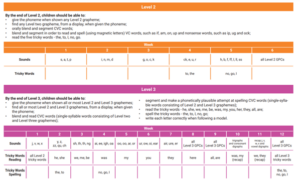
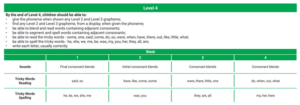
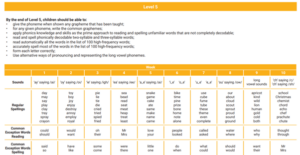
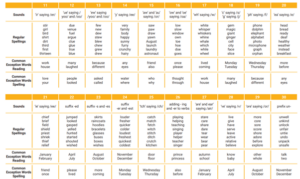
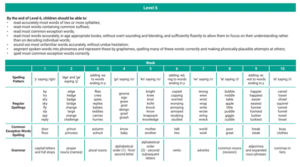

Phonics Impact
By the end of Key Stage 1, children at Mottram have the required phonics knowledge and application of these skills to become fluent readers and competent writers moving into KS2. Their confidence, resilience and engagement in phonics lessons foster a love for reading and writing.
Formative assessment strategies, which are implemented in all sessions and summative assessments, which are gathered on a half termly basis, allow pupil’s progress in Phonics to be monitored using our tracking document. It provides opportunities for data analysis and encourages discussions around pupil progress, group progress, future learning and misconceptions, enabling us to respond and adapt teaching within the programme to provide additional support and challenge to pupils. Overall attainment in phonics is measured by the Phonics Screening Check at the end of Year 1, if required, provisions are put in place for children who do not meet the required pass mark.
Below is a table highlighting the end of year expectations for the level children at Mottram will be working within across EYFS and KS1;

Useful Websites
Online Read Alouds https://www.weareteachers.com/read-alouds-on-youtube/
Booktrust https://www.booktrust.org.uk
Phonics Play https://www.phonicsplay.co.uk#
Oxford Owl https://www.oxfordowl.co.uk/
Love Reading https://www.pearson.com/uk/learners/primary-parents/learn-at-home/help-your-child-to-enjoy-reading.html
First News https://www.firstnews.co.uk/
Useful Apps
– How to teach your monster to read
– Amazon Audible
– Epic
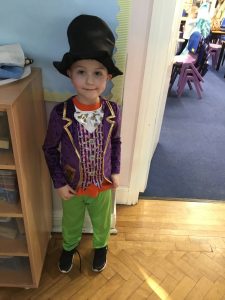

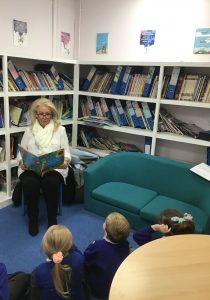
![]()











